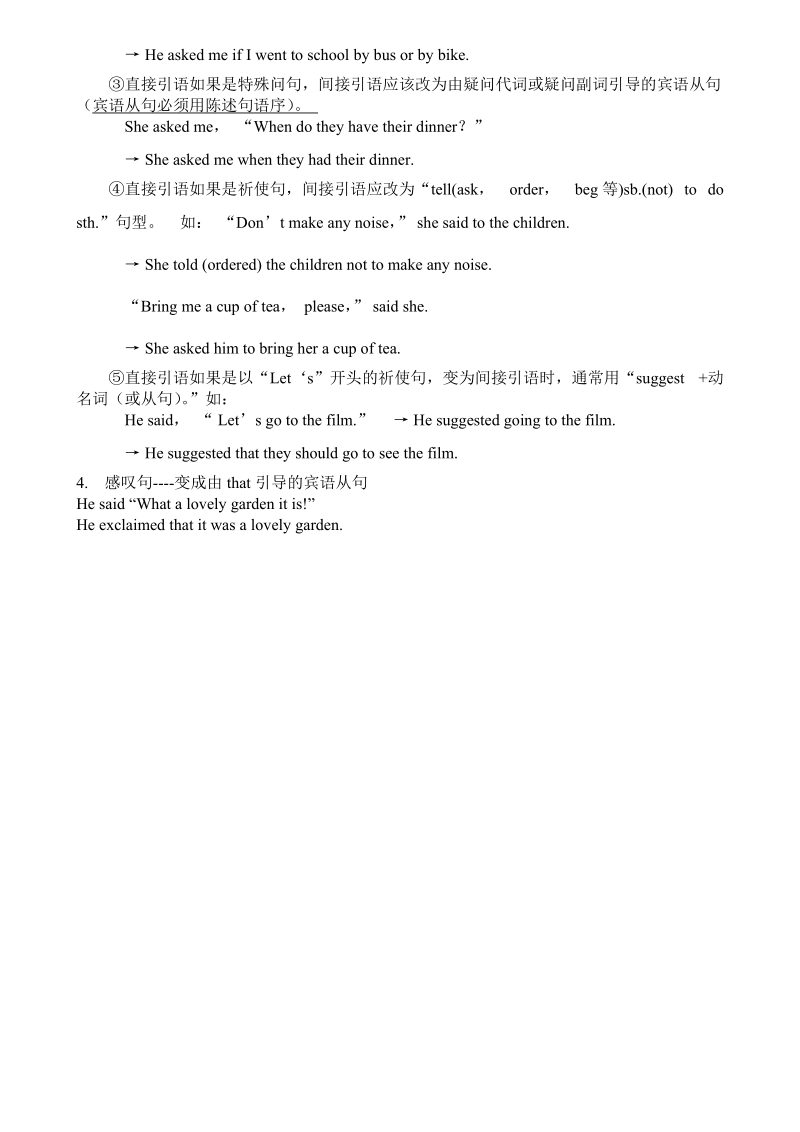 【语法精讲】人教版必修1 Unit 1直接引语变间接引语语法讲解
【语法精讲】人教版必修1 Unit 1直接引语变间接引语语法讲解
《【语法精讲】人教版必修1 Unit 1直接引语变间接引语语法讲解》由会员分享,可在线阅读,更多相关《【语法精讲】人教版必修1 Unit 1直接引语变间接引语语法讲解(3页珍藏版)》请在七七文库上搜索。
1、直接引语变间接引语语法讲解一、人称人称变化可以遵循如下顺口溜“一随主,二随宾,第三人称不更新” 。“一随主”是指在直接引语变间接引语时,如果从句中的主语是第一人称或被第一人称所修饰。从句中的人称要按照主句中主语的人称变化,如: She said. “My brother wants to go with me.”She said her brother wanted to go with her.“二随宾”是指直接引语变间接引语时,若从句中的主语及宾语是第二人称,或被第二人“你”所修饰,从句中的人称要跟引号外的主句的宾语一致。如果引号外的主句没有宾语,也可以用第一人称,如: He said t
2、o Kate,“How is your sister now?“ He asked Kate how her sister was then.“第三人称不更新”是指直接引语变间接引语时,如果从句中的主语及宾语是第三人称或被第三人称所修饰从句中的人称一般不需要变化,如:Mr. Smith said , “Jack is a good worker.”Mr. Smith said Jack was a good worker.二、时态直接引语在改为间接引语时,时态需要做相应的调整。其基本法则和我们刚刚学过的宾语从句的时态变化一致,也就是说从句时态要和主句时态一致。如果从句是过去时,主句要向后退一格
3、时态,变成一种过去时。1. She said. “I have lost a pen.” She said she had lost a pen. (现在完成 过去完成)2. She said. “We hope so.” She said they hoped so. (一般现在 一般过去)3. She said, “He will go to see his friend。 ”She said he would go to see his friend. (一般将来 过去将来)但要注意在以下几种情况下。在直接引语变为间接引语时,时态一般不变化。直接引语是客观真理。如: “The earth
4、 moves around the sun and the moon moves around the earth”, the teacher told me. The teacher told me the earth moves around the sun and the moon moves around the earth 。 直接引语是过去进行时,时态不变。如:Jack said, “John, where were you going when I met you in the street?” Jack asked John where he was going when he
5、 met him in the street.直接引语中有具体的过去某年、某月、某日作状语,变为间接引语时,时态不变。如: Xiao Wang said, “I was born on April 20, 1980.” Xiao Wang said he was born on April 20, 1980.直接引语如果是一般现在时。表示一种反复出现或习惯性的动作,变间接引语,时态不变。如: He said, “I get up at six every morning.” He said he gets up at six every morning.如果直接引语中的情态动词没有过去时的形式



- 配套讲稿:
如PPT文件的首页显示word图标,表示该PPT已包含配套word讲稿。双击word图标可打开word文档。
- 特殊限制:
部分文档作品中含有的国旗、国徽等图片,仅作为作品整体效果示例展示,禁止商用。设计者仅对作品中独创性部分享有著作权。
- 关 键 词:
- 语法 人教版 必修 Unit1 直接 引语 间接 讲解
 七七文库所有资源均是用户自行上传分享,仅供网友学习交流,未经上传用户书面授权,请勿作他用。
七七文库所有资源均是用户自行上传分享,仅供网友学习交流,未经上传用户书面授权,请勿作他用。



 浙公网安备33030202001339号
浙公网安备33030202001339号
链接地址:https://www.77wenku.com/p-80995.html